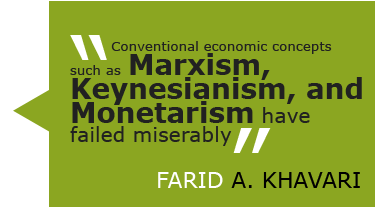Our economic and political systems simply can't continue in their current state. No matter how one looks at or interprets the situation, it's clear that costs are the root of our economic woes. Massive unemployment, increasing foreclosures, rising energy costs (either directly or indirectly), unaffordable health care, increasing poverty, and the sad state of our economy in general ultimately stem from runaway costs, as reflected by the permanent decline we've seen in general purchasing power. Bailouts, plundering, swindling, and exploitation not only devastate the economy but break down its foundation while threatening the well-being–and very existence–of humanity.
Conventional economic concepts such as Marxism, Keynesianism, and Monetarism have failed miserably because they basically ignore technology and productivity. Socialism and capitalism have followed the same path, as reflected in increasing disparities of all kinds and a wide range of economic problems–which, if not dealt with soon, could lead to worldwide economic and political chaos.
Given the crisis, no economy can operate as it did before. It's crucial that we alter our course in the right direction immediately. That right direction is toward a zero-cost economy.
|
|

|
Creating a zero-cost economy is synonymous with creating general capitalism, as opposed to the elite capitalism we have now. General capitalism shouldn't be mistaken for socialism. In stark contrast to socialism and elite capitalism, general capitalism promotes true ownership and stable wealth–ownership achieved relatively quickly by reducing or eliminating recurring costs and consequently increasing purchasing power, ultimately leading to a carefree economy (carefreeism).
To realize a zero-cost economy, we must use environmentally safe energy technologies, increase productivity by implementing the ultimate productivity speed, and make financing not just consumer friendly but purposeful. Finally, anything an individual or a household owns should reflect true ownership–that is, ownership without future or recurring costs attached. In a zero-cost economy, once a property is paid off, the person will own it outright with no future or recurring costs attached.
|
|